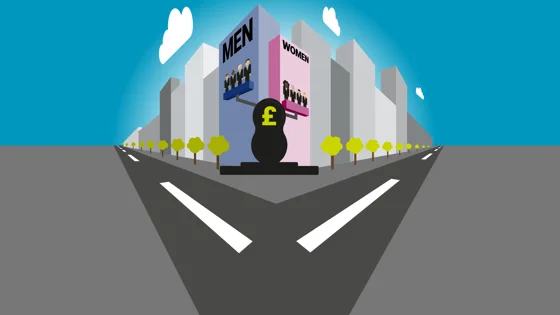Early career "aspiration gap" holding women back in legal sector

Contents
- What the American legal sector can tell us about promotional practices and gender gaps
- Aspiring to promotion is more likely to lead to promotion
- Why are female lawyers lowering their ambitions?
- The maternity gap: what impact do children have on promotion?
- Discrimination, low-level harassment, and realignment of ambitions
Women around the world and across many sectors are being promoted at a lower rate than men in many high-skill occupations. When the question of why women are failing to progress to positions of power is explored, the impact of children, or the argument that men are simply better at asking for the rise, are often given as key reasons for this imbalance.
New research into the careers of American lawyers, however, has uncovered another gender divide – this time around aspirations. It is this aspirational gender gap which is driven by early professional experiences and by future fertility choices. The researchers argue that is a primary cause for the promotional inequity that becomes apparent as cohorts move through their careers.
[Despite] entering private law firms at similar levels… women were still 14 per cent less likely to become partners after 12 years of legal practice than their male counterparts.
What the American legal sector can tell us about promotional practices and gender gaps
There are several factors that make the legal sector a good one to explore the gender promotion gap, says Dr Cuñat, Associate Professor of Finance at LSE and one of the authors of Gender Promotion Gaps: career aspirations and workplace discrimination. "Firstly, private law firms in the US have the same hierarchy of career progression. Promotion is well defined – ultimately, it’s did you make partner or not? It is also linked to performance, which is measured in a very transparent way, with clear targets such as the hours worked and hours billed."
Despite the transparent structures and an increasing awareness of gender inequality, however, promotion in the legal sector still appears to be tilted towards men.
"In recent years, male and female lawyers have been entering private law firms at similar levels - with equal educational attainments, from similarly prestigious law courses etc," explains Dr Cuñat. "One would therefore expect the promotion gap to be lower for younger cohorts, and yet this is not the case. Despite entering the profession with the same strengths and ambitions, within our sample, we found that women were still 14 per cent less likely to become partners after 12 years of legal practice than their male counterparts. So, we wanted to understand what was going on."
After the JD, anationally representative survey of almost 5,000 US-based lawyers admitted to the bar in 2000, provided a wealth of data with which to tease out potential reasons for the lack of equity around promotion. The legal cohort were tracked for over a decade and surveyed at three points over their careers, providing an array of information on their backgrounds, daily work and, crucially, their ambitions and goals - including their expectations of being made a partner in the firm. The team were also able to track those who were promoted to partner status by 2012.
Those with high aspirations were the ones who worked longer, billed more hours and were less likely to switch firms in early or mid-career.
Aspiring to promotion is more likely to lead to promotion
To explore the reasons behind the legal gender promotional gap, Dr Cuñat and his colleagues (Ghazala Azmat and Emeric Henry from Sciences Po) took a novel approach, exploring what impact aspirations – how much an individual wanted to become partner – might have on an individual’s path to partner. It was here that this new gender gap became apparent.
"When we looked at the ambitions reported when the lawyers were beginning their careers, we don’t see an aspiration gap. There doesn’t appear to be any difference in professional aspirations between the male and female lawyers over becoming partner," says Dr Cuñat. "Five years after this, however, we found a very different picture – female lawyers were now 16 per cent less likely to report that they aspired to become partner. So, although they are still quite early into their careers, we find that a gender aspiration gap has now appeared."
While the cohort's professional aspirations do not appear to be different for male or female lawyers at their entry into the profession (approximately one to two years after taking the bar exam), the researchers found that, by 2007, two thirds of the men surveyed were still aiming for partnership compared to just one third of the women.
This aspirational difference between men and women, the researchers argue, is the most important factor in explaining the gender promotion gap. Their analysis reveals a direct correlation between those with high aspirations and high-performance outcomes, highlighting how this gap in aspirations could play out in terms of the performance measures needed to make partner.
"Aspirations incentivise people and encourage effort, and our analysis found that the ambition to become a partner was the most important factor in being able to predict whether a lawyer does or doesn’t become a partner," explains Dr Cuñat. "We found that those with high aspirations were the ones who worked longer, billed more hours and were less likely to switch firms early or mid-career. Essentially, the effort that lawyers put into becoming partners is affected by their aspirations."
Why are female lawyers lowering their ambitions?
Our findings suggest that, for women, having high aspirations to become partner is likely to impact on the decision to start a family.
The researchers wanted to understand what was behind this lowering of aspirations for the female lawyers in their data set.
"Aspirations can be impacted by conditions at work," says Dr Cuñat. "How easy it is for you to work hard? How pleasant is the environment for you? Small changes in the environment might change people’s aspirations in ways that would then have a knock-on effect on the way or amount of work they do, and so affect your chance of promotion. We found that very small changes in the initial conditions of work could create large outcome changes with regards to the measures of success needed for promotion, andwe relate this to two things – fertility decisions and discrimination."
The maternity gap: what impact do children have on promotion?
"Having found this aspiration gap, we wanted to understand why it might be occurring," says Dr Cuñat. "First, we asked, do children predict promotion?"
The data was revealing: of the lawyers surveyed, those who were the most successful (ie, those who would appear to be more likely to be promoted given their initial characteristics such as choice of law school, grades etc), both male and female, tended to have more children. The researchers also found that the female lawyers with higher aspirations to become partner had less children, while the opposite was true for the men. The data suggests, they argue, that female lawyers face a stronger trade-off between family and work than their male counterparts, and that their understanding of the pressures of balancing a high-powered legal career and family life could be leading those who want to have children to strategically lower their career aspirations as a result.
Having children does appear to have a higher professional cost to women than men, the researchers conclude. "Our findings suggest that, for women, having high aspirations to become partner is likely to impact on the decision to start a family," says Dr Cuñat.
"Equally, those who want a family might anticipate this will be more difficult if they become partner, and as a result, they might re-set their aspirations earlier in their career to manage this. This does suggest that wanting a family might impact on the aspirations of female lawyers and lead them to decide that becoming partner isn’t a plausible goal."
Discrimination, low-level harassment, and realignment of ambitions
Experiences of discrimination are also a significant factor in women re-setting their aspirations, the researchers argue.
"When we looked at explicit discrimination - for example when cases aren’t fairly assigned or hours are discounted – we don’t see any great effect on women’s aspirations," says Dr Cuñat. "In our sample, women didn’t report feeling explicitly discriminated against by their respective companies. When we look at issues of informal discrimination, however, there we do see a gender divide around people’s experiences."
Of those surveyed, 25 per cent of women said that they had experienced demeaning comments and harassment, in comparison with just six per cent of men.
"This variable has a lot of traction in explaining your promotion aspirations," concludes Dr Cuñat. "And this is why we argue that early interventions to improve the culture of a workplace in ways that make women feel more comfortable could have an amplified effect on their likelihood of promotion.
"There is a strong correlation between setting one’s aspirations and hopes around an achievable goal. If you can see your future, you’re going to aim just that bit more in your daily work to achieve it. But if you look at your future and it looks a little bit worse, then it becomes much harder to put your soul into it and you’re more likely to set yourself lower goals."
Dr Vicente Cuñat was speaking to Jess Winterstein, Acting Head of Media Relations at LSE
Download a PDF version of this article




